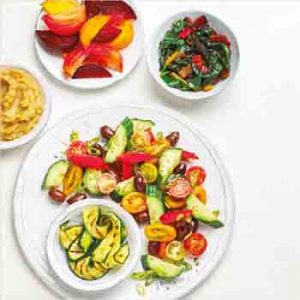
More evidence that low-calorie sweeteners are bad for your health
Studies show that artificial sweeteners can raise the risk of hypertension, metabolic syndrome, type 2 diabetes and heart disease, including stroke.

It’s a fact that our skin ages, but that doesn’t mean we can’t keep it looking as fresh and line-free as possible with help from the foods we eat.
Over the decades, skin gradually loses elasticity, so from your 30s onwards, it’s essential to eat foods that support collagen production. You can support your diet and skin with a good multivitamin and mineral supplement. In later decades, omega oil and hyaluronic acid supplements are also helpful.
Here’s how to get the best form your food, whatever your age.
In your 20s
A busy social life can mean a healthy diet is low priority. You may go through a phase of not eating well and overloading your body with toxins that can be prematurely ageing for skin. Up until your late 20s you may also still be dealing with outbreaks of acne and other skin problems such as eczema. Many young women are lacking in iron, which leads to pale skin and dark under eye circles.
Eat: Antioxidant-rich fruit and vegetables, especially those high in vitamin C, such as kale, kiwi, and peppers. Eat green leafy vegetables, nuts and seeds, wholegrains and pulses to ensure you have enough iron.
In your 30s
The first signs of ageing, such as fine lines, may start to appear now as sebum production slows down. Skin may look dry and dull, and you may have the odd spot still. Pores enlarge, and skin pigment can become patchy, which can be linked to hormonal changes in pregnancy. Skin needs plenty of nourishment now to lay foundations for healthy skin in the future.
Eat: Brightly coloured, nutrient-dense foods, such as tomatoes, carrots, and broccoli, with carotenoids that protect skin against ageing free radicals. Aid collagen with healthy proteins from oily fish, legumes, nuts, seeds, and lean meats.
In your 40s
Nose-to-mouth lines become more obvious now and skin loses moisture as sebum production continues to drop. Skin can look dry overall and thinner, and skin tone may be uneven.
Eat: Plenty of good, skin-nourishing oils such as coconut, linseed, and hemp, and fresh, oily fish, such as salmon and mackerel. B vitamins are also crucial to help prevent dry skin. Get B vitamins from grains such as brown rice, wholegrain cereals, and wholemeal bread. For vitamin B12 you will need to eat fish, poultry, and lean meat or take a supplement if you’re vegetarian.
In your 50s
Elastin and collagen levels can drop to unhealthy levels now so this is when we need to work hardest to make sure our diets contain the optimum nutrients to maintain these important skin proteins at healthy levels. Changes in hormones can lead to flushing and rosacea.
Eat: Essential fatty acids to keep skin supple from olive and coconut oils, avocado, and oily fish. Include healthy proteins from pulses, nuts, eggs, fish, and lean meat. Red foods, such as berries and tomatoes, contain collagen-boosting lycopene, and organic soy products and pulses help to balance hormones.
In your 60s
Our collagen levels and ability to manufacture antioxidants decline as we get older, so it’s even more important to get an abundance of antioxidants from our diets. The manufacture of hyaluronic acid also declines with age. This is vital for healthy collagen and helps skin to retain moisture, keeping it plump and preventing dryness and wrinkles.
Eat: Healthy proteins and oils from oily fish, coconut and olive oils, and antioxidant-rich fruit and vegetables, including leafy greens and root veg. Include foods with hyaluronic acid, such as soy products and sweet potatoes.

Please subscribe me to your newsletter mailing list. I have read the
privacy statement